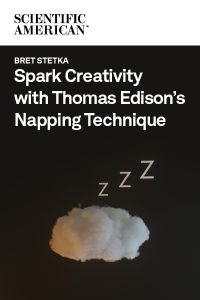Join getAbstract to access the summary!

Join getAbstract to access the summary!
Bret Stetka
Spark Creativity with Thomas Edison’s Napping Technique
Waking yourself from the twilight state just before sleep may help you to solve a challenging problem, a study shows
Scientific American, 2021
What's inside?
A new study shows that awakening just before sleep helps people solve problems and fuels creativity.
Recommendation
Some of the world’s great thinkers and creative minds eschewed sleep, or used it to delve into the mind’s deepest insights. A new study indicates that one particular stage of sleep known as “N1” may contain the human brain’s strongest affinity for clearly seeing elusive problems and defining creative ideas. In the future, people may be able to harness this state of mind, and use it to solve real-world tasks.
Summary
About the Author
Bret Stetka is a writer based in New York City and editorial director of Medscape Neurology (a subsidiary of WebMD). His work has appeared in Wired, NPR and The Atlantic. He graduated from the University of Virginia School of Medicine in 2005.


















Comment on this summary